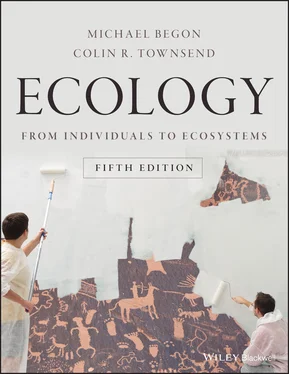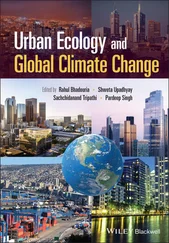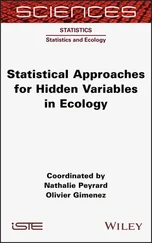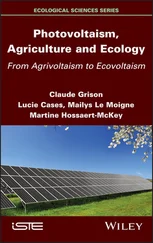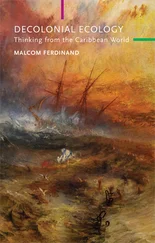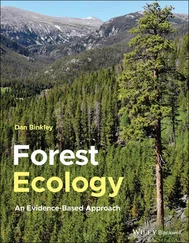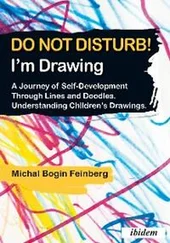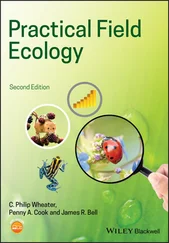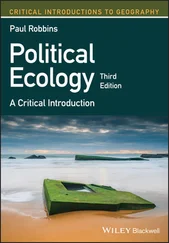At our publisher Wiley, we are grateful to Ward Cooper (now moved on), who brought us back within the fold, and throughout the writing and production to Sarah Keegan, Jane Andrew, Jane Grisdale and Debbie Maizels.
Mike Begon
Colin Townsend
Introduction: Ecology and its Domain
Definition and scope of ecology
The word ‘ecology’ was first used by Ernest Haeckel in 1866. Paraphrasing Haeckel we can describe ecology as the scientific study of the interactions between organisms and their environment. The word is derived from the Greek oikos , meaning ‘home’. Ecology might therefore be thought of as the study of the ‘home life’ of living organisms. A less vague definition was suggested by Krebs (1972): ‘Ecology is the scientific study of the interactions that determine the distribution and abundance of organisms’. Notice that Krebs’ definition does not use the word ‘environment’; to see why, it is necessary to define the word. The environment of an organism consists of all those factors and phenomena outside the organism that influence it, whether these are physical and chemical (abiotic) or other organisms (biotic). The ‘interactions’ in Krebs’ definition are, of course, interactions with these very factors. The environment therefore retains the central position that Haeckel gave it.
Krebs’ definition has the merit of pinpointing the ultimate subject matter of ecology: the distribution and abundance of organisms – where organisms occur, how many occur there and why . This being so, it might be better still to define ecology as:
the scientific study of the distribution and abundance of organisms and the interactions that determine distribution and abundance.
As far as the subject matter of ecology is concerned, ‘the distribution and abundance of organisms’ is pleasantly succinct. But we need to expand it. The living world can be viewed as a biological hierarchy that starts with subcellular particles, and continues up through cells, tissues and organs. Ecology deals with the next three levels: the individual organism , the population (consisting of individuals of the same species) and the community (consisting of a greater or lesser number of species populations). At the level of the organism, ecology deals with how individuals are affected by (and how they affect) their environment. At the level of the population, ecology is concerned with the presence or absence of particular species, their abundance or rarity, and with the trends and fluctuations in their numbers. Community ecology then deals with the composition and organisation of ecological communities. Ecologists also focus on the pathways followed by energy and matter as these move among living and non‐living elements of a further category of organisation: the ecosystem , comprising the community together with its physical and chemical environment.
There are two broad approaches that ecologists can take at each level of ecological organisation. First, much can be gained by building from properties at the level below: physiology when studying organismal ecology; individual clutch size and survival probabilities when investigating the dynamics of individual populations of species; food consumption rates when dealing with interactions between predator and prey populations; limits to the similarity of coexisting species when researching communities, and so on. An alternative approach deals directly with properties of the level of interest – for example, niche breadth at the organismal level; relative importance of density‐dependent processes at the population level; species diversity at the level of community; rate of biomass production at the ecosystem level – and tries to relate these to abiotic or biotic aspects of the environment. Both approaches have their uses, and both will be used throughout the book.
Explanation, description, prediction and control
At all levels of ecological organisation we can try to do a number of different things. In the first place we can try to explain or understand . This is a search for knowledge in the pure scientific tradition. Obviously, though, in order to understand something, we must first have a description of whatever it is that we wish to understand. This, in itself, adds to our knowledge of the living world. Note, however, that the most valuable descriptions are those carried out with a particular problem or ‘need for understanding’ in mind. All descriptions are selective: but undirected description, carried out for its own sake, is often found afterwards to have selected the wrong things.
Ecologists also often try to predict what will happen to an organism, a population, a community or an ecosystem under a particular set of circumstances: and on the basis of these predictions we may try to control the situation. We may try to minimise the effects of locust plagues by predicting when they are likely to occur and taking appropriate action. We may try to protect crops by predicting when conditions will be favourable to the crop and unfavourable to its enemies. We may try to maintain endangered species by predicting the conservation policy that will enable them to persist. And we may try to conserve biodiversity in order to maintain ecosystem ‘services’ such as the protection of chemical quality of natural waters. Some prediction and control can be carried out without explanation or understanding. But confident predictions, precise predictions and predictions of what will happen in unusual circumstances can be made only when we can explain what is going on. Mathematical modelling has played, and will continue to play, a crucial role in the development of ecology, particularly in our ability to predict outcomes. But it is the real world we are interested in, and the worth of models must always be judged in terms of the light they shed on the working of natural systems.
Note, too, that there are two different classes of explanation in biology: proximal and ultimate explanations. For example, the present distribution and abundance of a particular species of bird may be ‘explained’ in terms of the physical environment that the bird tolerates, the food that it eats and the parasites and predators that attack it. This is a proximal explanation. However, we may also ask how this species of bird comes to have these properties that now appear to govern its life. This question has to be answered by an explanation in evolutionary terms. The ultimate explanation of the present distribution and abundance of this bird lies in the ecological experiences of its ancestors. There are many problems in ecology that demand evolutionary, ultimate explanations: ‘How have organisms come to possess particular combinations of size, developmental rate, reproductive output and so on?’ (Chapter 7), ‘What causes predators to adopt particular patterns of foraging behaviour?’ (Chapter 9) and ‘How does it come about that coexisting species are often similar but rarely the same?’ (Chapters 8 and 16). These problems are as much part of modern ecology as are the prevention of plagues, the protection of crops and the preservation of rare species. Our ability to control and exploit ecosystems cannot fail to be improved by an ability to explain and understand. And in the search for understanding, we must combine both proximal and ultimate explanations.
Ecologists are concerned not only with ecosystems, communities, populations and organisms in nature , but also with man‐made or human‐influenced environments (plantation forests, wheat fields, grain stores, nature reserves and so on), and with the consequences of human influence on nature (pollution, overharvesting, the spread of invasive species, global climate change, etc.). Our influence is so pervasive that we would be hard pressed to find an environment that was totally unaffected by human activity. Indeed, moves are afoot to designate a new geological epoch – the Anthropocene – the latest slither of geological history during which people have become a major geological force and the major ecological force around the globe. Environmental problems are now high on the political agenda and ecologists clearly have a central role to play: a sustainable future depends fundamentally on ecological understanding and our ability to predict or produce outcomes under different scenarios.
Читать дальше
